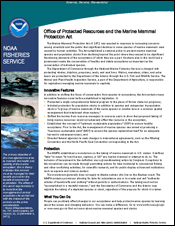40th Anniversary of the Marine Mammal Protection Act (MMPA)

The Marine Mammal Protection Act (MMPA) was enacted on October 21, 1972. All marine mammals are protected under the MMPA.
The MMPA prohibits, with certain exceptions, the "take" of marine mammals in U.S. waters and by U.S. citizens on the high seas.
Find out more about the MMPA below:
- Whale SENSE
- Marine Mammal Health and Stranding Response Program Turns 20
- Celebrating Springer - Orphan Orca that Overcame the Odds
- Dolphin SMART Program
- How Can I Become a Marine Mammal Scientist?
- Marine Mammal Species
Whale SENSE - the smart way to whale watch
The Northeastern United States is one of the most impressive whale watching destinations in the world, drawing over a million whale watchers each year. In order to promote responsible viewing among commercial whale watching companies, NOAA Fisheries Northeast Regional Office teamed up with Stellwagen Bank National Marine Sanctuary and the Whale and Dolphin Conservation Society (WDCS) to create a unique program called Whale SENSE.
This voluntary program trains whale watching captains and naturalists on the laws, guidelines, and species behaviors they need to know in order to provide responsible whale watching tours. It also provides a forum for professional discussion among whale watch companies.
Marine Mammal Health and Stranding Response Program Turns 20
Rescuing and Protecting the Health of Marine Mammals since 1992
Marine mammals are important indicator species of the health of the ocean.They are top level predators that eat many of the same fish that we do, and several species live in coastal areas utilized by people.
When marine mammals show signs of illness or distress, they may be signaling changes in the marine environment that might also have significant implications for the health of our ocean ecosystems.
Monitoring and studying marine mammal health is important for their conservation as well as maintaining healthy oceans.
Celebrating Springer - Orphan Orca that Overcame the Odds
Springer, an orphaned killer whale calf rescued from Puget Sound and returned to her family in Canada in 2002, was sighted again in the summer of 2012.
Alone and ailing, the small whale was first seen in Puget Sound in early 2002. The young calf on her own caused immediate concern and set local researchers on a quest to learn more. Researchers used photos of her saddle patch and dorsal fin, as well as recordings of her calls, to identify her as "A73." She was an orphan from "A" pod, one of Canada’s Northern Resident killer whale communities. A73, also known as Springer, was far from home, separated from her family, and following a Washington State ferry around.
The Pacific Northwest community came together to save this small whale. NOAA Fisheries worked closely with local communities and Canadian officials in this unprecedented rescue effort to bring the young orca home.
Since her successful family reunion in 2002, Springer has returned each year to summer in British Columbia's Johnstone Strait with A pod. Her annual return to the waters of British Columbia serves as a reminder to everyone working on killer whale conservation, in the United States and Canada, that much can be accomplished by working together toward a common goal.
Feature Story: Dolphin SMART Program
Dolphin SMART is a unique program that benefits both dolphins and participating dolphin-viewing businesses.
Stay back 50 yards from dolphins
Move away cautiously if dolphins show signs of disturbance
Always put your engine in neutral when dolphins are near
Refrain from feeding, touching, or swimming with wild dolphins
Teach others to be Dolphin SMART
How Can I Become a Marine Mammal Scientist?

William Perrin, Senior Scientist for Marine Mammals with
NOAA's Southwest Fisheries Science Center, gives Advice to Students ![]()
from Aquatic Mammals on Vimeo
More scientist interviews from the Aquatic Mammals journal. ![]()
MMPA Enacted in 1972
The Marine Mammal Protection Act (MMPA) was enacted on October 21, 1972. All marine mammals are protected under the MMPA.
The MMPA prohibits, with certain exceptions, the "take" of marine mammals in U.S. waters and by U.S. citizens on the high seas. Prohibited "take" includes to:
- harass
- hunt
- capture
- kill
- collect
- attempt to harass, hunt, capture, kill, or collect
Marine Mammal Species
There are approximately 125 marine mammal species worldwide managed under the MMPA. Two major groups of marine mammals are:
More Information
- Marine Mammal Education Resources
- Marine Mammal Species Information
- MMPA Policies, Guidances, and Regulations
- MMPA Annual Report Archive
- Marine Mammals Listed Under the Endangered Species Act
- Marine Mammal Stock Assessment Reports
- Dolphin SMART Program
Updated: September 4, 2012








